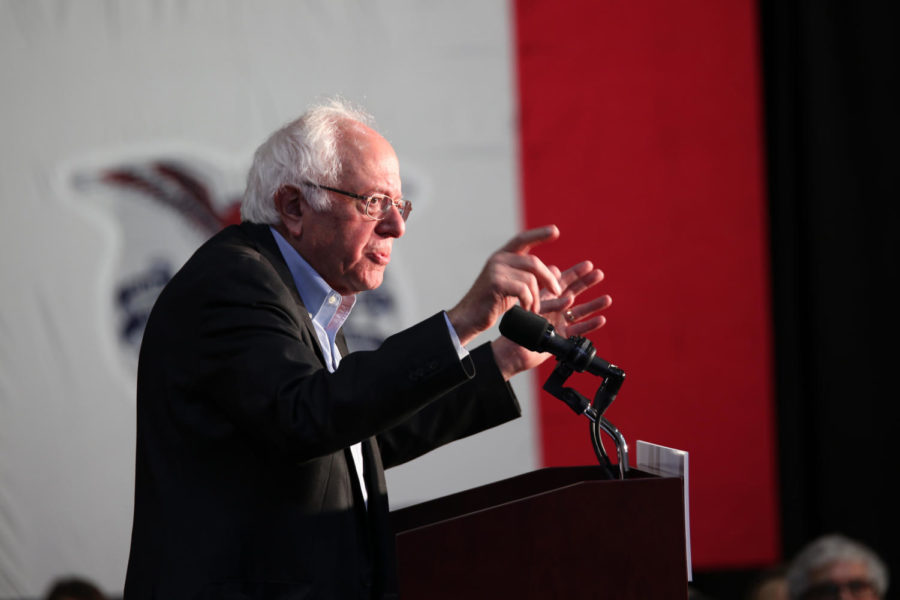Holst: America needs universal health care
Chris Jorgensen/Iowa State Daily
Vermont Sen. Bernie Sanders points toward the audience while giving a speech Oct. 5 to supporters at Drake University in Des Moines.
November 30, 2017
Health care is a hot button issue in the United States, and understandably so.
You indeed may have caught wind of the massive debate surrounding the Affordable Care Act, or Obamacare. I really, really don’t want to talk about that.
First of all, the perception of Obamacare is so twisted and distorted that many of the people who claim to have an opinion on it really know very little about it. Nobody, outside of people who actually have had their lives or the lives of someone they love affected directly by the law, is likely to change the opinion they already have about Obamacare.
Therefore, writing a piece in favor or against Obamacare is probably pointless. What remains true is that those who wish to repeal Obamacare have failed epically in an attempt to provide some sort of actionable alternative. However, there is a solution. That solution is single-payer, or universal, health care.
The concept behind universal health care is simple: the government pays for and provides health care for its citizens. This is the basis for the health care systems in nearly every developed nation on Earth, with the exception of America.
In America, people are now required to purchase health insurance on the free market from a company if they don’t qualify for Medicaid or Medicare. In America, customers pay premiums every month for health care. With universal health care, it is provided and paid for by tax dollars.
With that being said, there are two main arguments for universal health care: it is a more efficient system and a more moral system.
One of the main arguments opponents to a universal plan will use is that care is rationed, which leads to more wait times. However, this is actually not entirely true.
While wait times in Canada have been a challenge, individuals in most developed countries actually are able to see a doctor more quickly than Americans. Furthermore, countries with universal health care experience better health outcomes at a much lower cost to the taxpayer.
Because of this, the tax increase many Americans would experience would be less than the amount of money they would save by not having to pay health care premiums or deductibles anymore.
Another thing that would reduce the cost to the taxpayer is the lack of a profit motive for the government. Insurance companies have to charge not only enough money to make sure they can pay for clients’ care, but also pay the salaries of those who push paper for the company, and then still more to maintain a profit.
The government would have to pay for care and paper-pushers, but the profit motive is out the window, which leads to lower costs. As a cherry on top of that sundae, countries with universal coverage have longer life expectancies and fewer preventable deaths.
Now comes the moral argument.
If, somehow, you are not persuaded by better care at a lower cost for every single American, please consider this: forty five thousand Americans die every year because they don’t have access to health insurance.
And that statistic doesn’t capture the group of Americans who experience major health complications because they couldn’t afford to get preventative care like a basic checkup.
Ten percent of Americans don’t have health insurance. Even if you don’t believe all of the evidence suggesting universal health care is less expensive than the current system, there is a moral imperative to make sure people don’t die because they can’t afford to pay health care premiums.
A civil society does not allow that to happen. In most of the developed world, people have reached the same conclusion. It is time America finally follows their lead. To put it another way, health care should not be viewed as a product to be purchased, but as a basic human right.
Universal health care hasn’t truly been seriously considered by this Congress, but it ought to be. And even though the evidence all points to better care at a reduced cost, as long as Congress and the White House remain conservative, it likely won’t be.
But for every single day that passes without universal health care for Americans, more people will die. The current health care system is failing us. Our government is failing us. It is time to ensure every American has the right to basic health care. It is critical to our lives, liberties and pursuits of happiness.
















